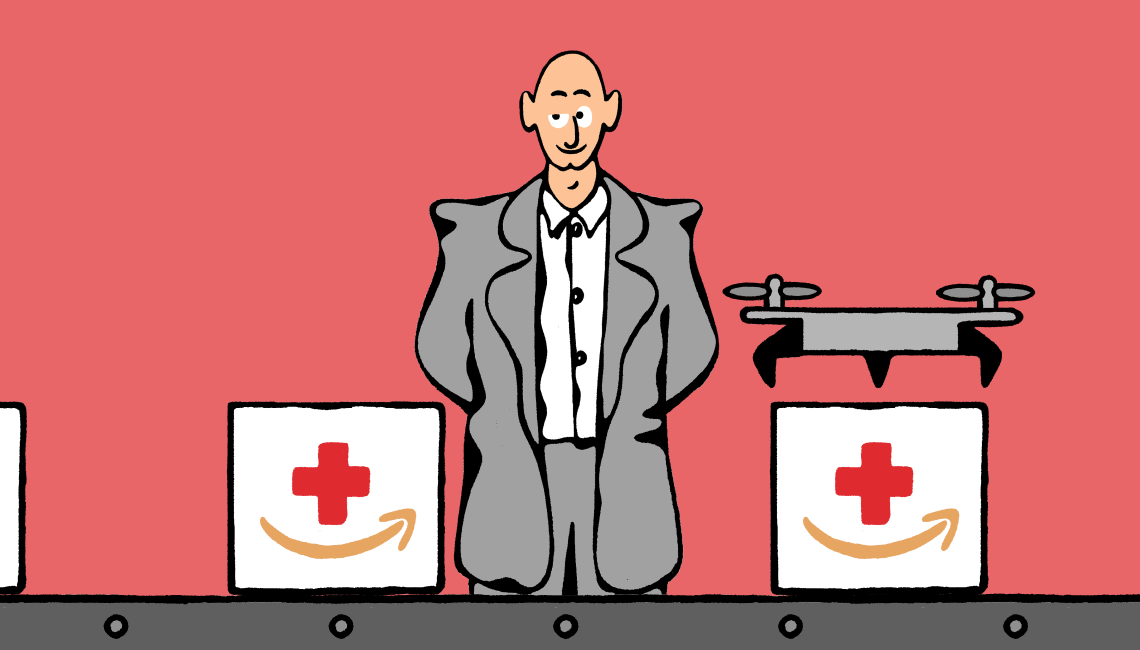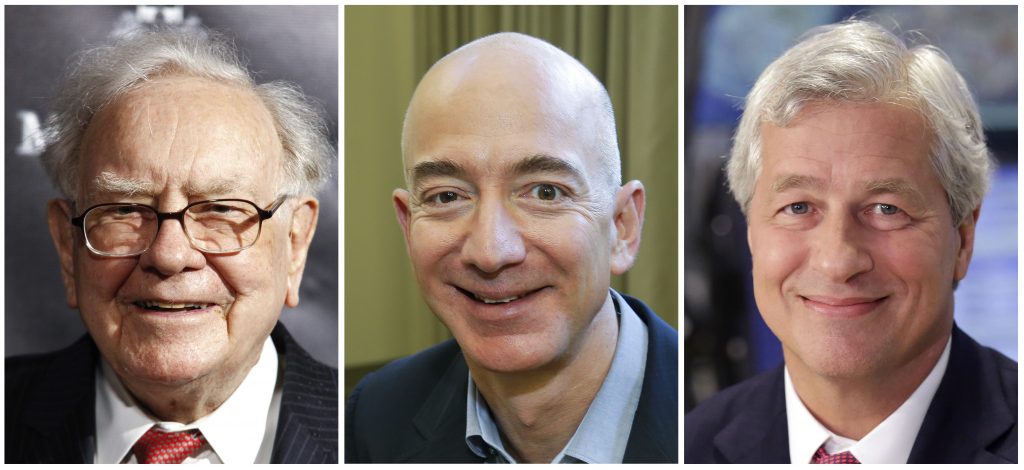Now even healthcare is getting Amazonified
[caption id="" align="alignnone" width="1140"] Illustration: Patrik Mollwing[/caption]
Is there anything the world’s richest man, Jeffrey Preston Bezos, can’t do?
I don’t mean to go all fan boy-ish on you, but it’s been riveting watching him run the table. Bezos has grown Amazon into a juggernaut whose value exceeds Walmart, Costco, Target, Kohls and Macy’s—combined—and has unleashed it, Pac-Man style, on everything else. Amazon Web Services, the preeminent cloud-computing platform, powers virtually every startup in Silicon Valley, as well as such giga-grandees as Netflix and Instagram. In June, Amazon bought Whole Foods, as a way to get its same-day delivery business even closer to every affluent community in the U.S.
Along the way, and out of his own pocket, Bezos tried to solve a really hard problem—he bought the Washington Post, which like every newspaper, was on the ropes. Naturally, he’s doing a credible job of turning it around. And just for yuks, he started rocket maker Blue Origin, which plans to take the first tourists into space in the spring of next year.
So it was exciting, though hardly surprising, when news broke last week that he and two of his buddies—Jamie Dimon, CEO and President of J.P. Morgan Chase, and Warren Buffett, Chairman and CEO of Berkshire Hathaway—are now going to give the troubled trillion healthcare industry a nice disrupting.
[caption id="attachment_37446" align="alignnone" width="1024"]
Illustration: Patrik Mollwing[/caption]
Is there anything the world’s richest man, Jeffrey Preston Bezos, can’t do?
I don’t mean to go all fan boy-ish on you, but it’s been riveting watching him run the table. Bezos has grown Amazon into a juggernaut whose value exceeds Walmart, Costco, Target, Kohls and Macy’s—combined—and has unleashed it, Pac-Man style, on everything else. Amazon Web Services, the preeminent cloud-computing platform, powers virtually every startup in Silicon Valley, as well as such giga-grandees as Netflix and Instagram. In June, Amazon bought Whole Foods, as a way to get its same-day delivery business even closer to every affluent community in the U.S.
Along the way, and out of his own pocket, Bezos tried to solve a really hard problem—he bought the Washington Post, which like every newspaper, was on the ropes. Naturally, he’s doing a credible job of turning it around. And just for yuks, he started rocket maker Blue Origin, which plans to take the first tourists into space in the spring of next year.
So it was exciting, though hardly surprising, when news broke last week that he and two of his buddies—Jamie Dimon, CEO and President of J.P. Morgan Chase, and Warren Buffett, Chairman and CEO of Berkshire Hathaway—are now going to give the troubled trillion healthcare industry a nice disrupting.
[caption id="attachment_37446" align="alignnone" width="1024"] The Three Amigos: Buffett, Bezos and Dimon’s healthcare company will be “free from profit-making incentives and constraints.” (AP Photos)[/caption]
Some believe that in the broken healthcare system, Bezos has finally met his match. But not me. The bigger risk is that he will fix it—and that healthcare, like increasingly everything else in our lives, will be controlled by one company.
The Three Amigos: Buffett, Bezos and Dimon’s healthcare company will be “free from profit-making incentives and constraints.” (AP Photos)[/caption]
Some believe that in the broken healthcare system, Bezos has finally met his match. But not me. The bigger risk is that he will fix it—and that healthcare, like increasingly everything else in our lives, will be controlled by one company.
Every penny of the more than $3 trillion spent on healthcare each year goes into people’s pockets, and none of those folks are going to let Bezos, Buffett and Dimon pick their purses without a fight. And these are people who don’t lose very often.—Via The Huffington PostI know that sounds a little silly, or paranoid. And I’d also like to say that if we had to live under a benevolent dictatorship, Bezos would be a pretty good Supreme Leader. The trains (and everything else) would work well and run on time. I spent enough time with him in 1999, when I wrote his Person of the Year profile for TIME Magazine, to believe he has a good heart, a big heart—never mind that he’s yet to start doing philanthropic work. He will. But the steady concentration of wealth and power in the hands of one person—or, worse, one company that outlasts its founder—can’t possibly end well. Already, in the tiny town where I live, there are fewer and fewer places to shop. That’s partly because Amazon can beat any local merchant on price and, almost invariably, on selection. How long before Whole Foods runs our beloved neighborhood grocery store out of business? I have myself to blame: every day I get stuff from Amazon Prime. It’s so convenient! I will happily sign up for Amazon Health once it’s invented and offered. We humans always opt for the things that immediately gratify us, never mind the long-term consequences. We’re stupid like that. It’ll probably take a few years for Bezos to fix healthcare, even though it’s something he’s thought about almost from Amazon’s earliest days. Notes CNBC: “It’s no secret that [Bezos] has been thinking about healthcare since the 1990s, when he took a hands-on role at Drugstore.com. It’s still top of mind.” His fascination with the healthcare industry only intensified over the years. CNBC reported in July 2017 that Amazon had started a skunk works called 1492 that’s been working on medical records bookkeeping systems and other healthcare-related applications. That will likely be critical to Bezos’s turn-around plan. Adam Lashinsky, writing in Fortune, said that while Bezos and his partners didn’t precisely articulate their plan of attack last week, “they intimated two broad themes about how they intend to improve the experience of administering healthcare. First, it will involve technology, prompting speculation this will mean better digital records, intelligent physician provisioning, and cleverer insurance schemes. Second, the three heavyweights will experiment on their own million-plus employees, a diverse workforce spanning low-wage normal folk to the most elite of our society.” That second point is key. If one was going to try to unravel the healthcare mess, you’d want to start with a large base of people who already enjoy insurance, as well as the amenities of working for a top-flight company. The 2.5 million people who work for Amazon, J.P. Morgan and Berkshire are a perfect starter group—this is a population that has likely enjoyed good healthcare from day one, as opposed to people below the poverty line. That will keep costs down, while allowing the disrupters time to build, debug and iterate on a new system.
Nationwide, average premiums for family coverage for employees rose to $18,764 last year, an increase of 19 percent since 2012, according to the Kaiser Family Foundation. Workers are increasingly paying a greater share of those costs—they now pay 30 percent of the premium, in addition to high deductibles and growing co-payments.—Via The New York TimesWhat will that system look like? Bill Gurley, a Benchmark VC who’s especially well versed in and invests in the space, told Business Insider he suspects the final product will resemble a managed, integrated healthcare consortium like Kaiser Permanente. Kaiser, which provides its members with everything from doctors and clinics to its own hospitals, is an example of a so-called “narrow network”—meaning that system optimizes for high quality rather than lots of choice. “I don’t know how we get to reform until there’s narrow networks,” Gurley told BI. There’s something zen-like—and Orwellian—in that concept. The less choice you have, the better. Some day in the future, you’ll think of that when you’re sitting in the waiting room of your Amazon doctor, sipping your Amazon tea while reading your Amazon news on a Kindle, and contemplating an Amazon sightseeing trip into Amazon outer space.

